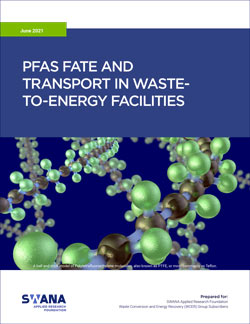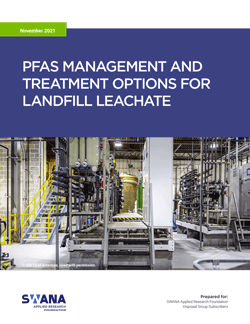PFAS Challenges to the Solid Waste Industry

ARF Reports on PFAS in Solid Waste
The SWANA Applied Research Foundation has recently completed reports that evaluate PFAS solid waste treatment technologies.
PFAS Fate and Transport in Waste-to-Energy (WTE) Facilities

The research findings in the report are based on a literature review and an analysis of investigations of PFAS emissions from WTE facilities.
This report is available free to ARF Waste Conversion and Energy Recovery (WCER) Group subscribers. The report will be available for purchase to SWANA members and the general public in June, 2022.
Read the Executive Summary Purchase Report (FREE to Members!)How Much PFAS is in Municipal Solid Waste (MSW)?
There is no standard method for establishing how much PFAS is in MSW. PFAS concentrations have been found to range from zero to more than 1,000 nanograms per gram of sample (ng/g). A value of 10 ng/g (10,000 PPT) is a good representative figure (to compare: the EPA issued a non-regulatory lifetime Health Advisory in 2016 of 70 PPT in drinking water.)
The Role of MSW Management
Municipal solid waste management is an essential public service. We acknowledge and embrace our role as environmental and public health stewards and our continued responsibility and commitment to providing a healthy and clean environment now and for future generations. To that end, SWANA supports actions and regulations that are based on credible science and developed after due consideration.
Industry Obligation to Manage PFAS
The Interstate Technology Regulatory Council identifies the following stakeholder concerns for waste management:
- Potential PFAS contamination in recycling and compost
- Wastewater discharges that may contain PFAS
- Wastewater sludge and other biosolids used for soil amendments that may contain PFAS
- Landfill leachate that may contain PFAS
- Stormwater discharges that may contain PFAS
- Whether PFAS cleanup methods and remedies fully protect human and ecological health
- Whether incineration technologies prevent toxic emissions
Further Reading
- Arie Kremen, Ph.D. “Leachate is the Driving Force for PFAS Sequestration in Landfills”, WasteAdvantage Magazine, 2020.
- Robert Mueller and Kate Emma Schlosser, “Stakeholder Perspectives Associated with Environmental Impacts of Per- and Polyfluoroalkyl Substances (PFAS)”, Interstate Technology Regulatory Council (ITRC) fact sheet, 2020.
Advertisement
Special Thanks
A special thank you to the Landfill Technical Division Landfill Leachate and Liquids Committee for providing up-to-date scientific and technical data about PFAS in solid waste.
Join Team/Contribute






